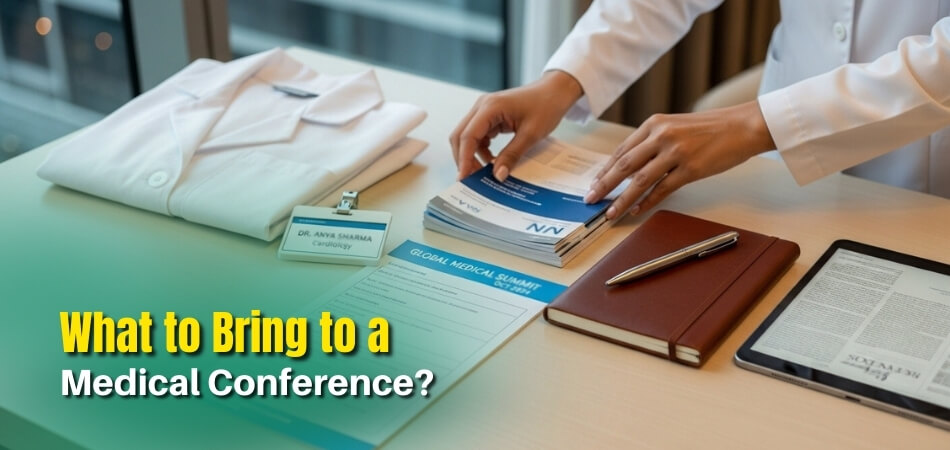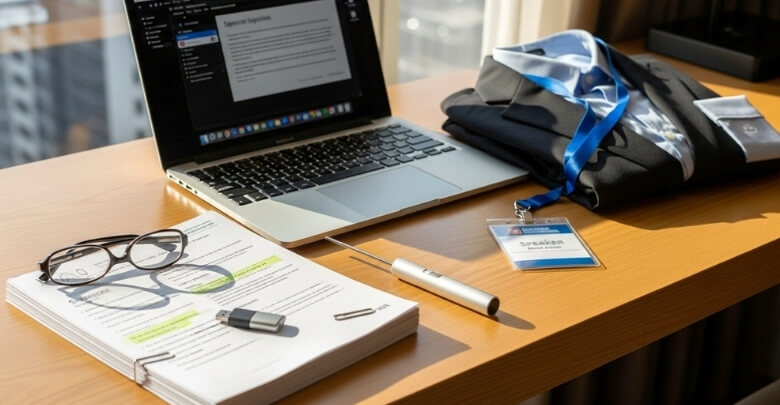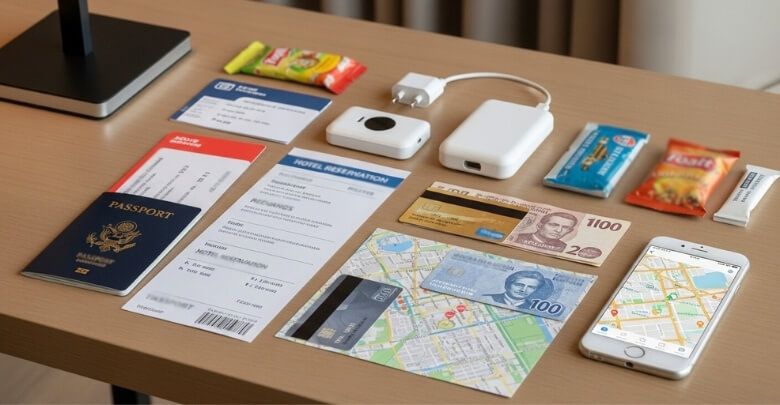Attending a medical conference is an exciting opportunity to learn, network, and share expertise, but the experience can quickly become stressful if you forget key essentials. This often leaves participants wondering, What to Bring to a Medical Conference?
The answer is simple: preparation is the key. From essential documents and presentation materials to health items and comfort essentials, what you pack directly shapes your conference experience. Having a clear plan helps you stay organized and ensures you can focus on valuable sessions and meaningful connections.
In this guide, we’ve outlined everything you should bring to a medical conference, along with helpful templates and checklists to make preparation easier. Whether you’re attending as a speaker, exhibitor, or participant, these tips will help you feel confident and ready from day one.
What to Bring to a Medical Conference?
Packing for a healthcare and medical conference is not just about clothes and toiletries; it’s about carrying the right tools that help you learn, connect, and present yourself professionally. Having the right essentials can make the difference between a stressful experience and a smooth, productive one. Here’s a detailed look at what you should bring:

Essential Conference Documents
Always start with the basics: registration confirmation, government-issued ID, conference badge, and travel documents. If you’re attending from abroad, don’t forget your visa papers and invitation letter. Keeping both digital and printed copies ensures you won’t be caught off guard if something goes missing.
Here’s a sample invitation letter for your understanding:
[Your Organization’s Letterhead or Logo]
[Date]To:
[Attendee’s Full Name]
[Attendee’s Address]
[City, Postal Code, Country]Subject: Official Invitation to Attend [Conference Name]
Dear [Attendee’s Name],
On behalf of [Organization/Institution Name], it is my pleasure to officially invite you to attend the [Full Conference Title], which will be held at [Venue, City, Country] from [Start Date] to [End Date].
This medical conference will bring together professionals, researchers, and experts to discuss advancements in [specific field, e.g., cardiology, oncology, public health]. Your participation will provide an excellent opportunity to exchange knowledge, network with colleagues, and engage in meaningful discussions that contribute to the field.
We confirm that you have been registered as a participant in this event. Please use this letter to support your visa application, travel arrangements, and professional documentation, if required.
Should you need additional information, do not hesitate to contact us at [Email Address] or [Phone Number].
We look forward to welcoming you to the conference.
Sincerely,
[Full Name]
[Title/Position]
[Organization/Institution Name]
[Official Contact Information]
Professional and Networking Essentials
Networking is one of the most valuable parts of attending a medical conference, and communication plays a central role in making it effective. A thoughtful follow-up email helps you stay memorable and strengthens the relationships you began in person. Having a simple template ready saves time and ensures your outreach is professional without feeling forced.
Here’s a sample of a follow-up networking email:
Subject: Great Meeting You at [Conference Name]
Dear [Recipient’s Name],
It was a pleasure meeting you at [Conference Name] on [Date]. I truly enjoyed our conversation about [specific topic you discussed, e.g., advancements in medical imaging or opportunities in residency programs] and found your insights very valuable.
I’d love to stay connected and continue exploring how we might share ideas or collaborate in the future. Please feel free to reach out if you’d like to discuss further, and I’d be happy to keep in touch through [LinkedIn/Email/Phone].
Thank you again for your time, and I look forward to staying in contact.
Best regards,
[Your Full Name]
[Your Position / Institution]
[Your Contact Information]
Technology and Backup Tools
From note-taking to presenting, tech items are indispensable. Carry your laptop or tablet, along with chargers, a portable power bank, and headphones. A USB stick with backup copies of your slides or research files is a must for presenters. If you’re speaking, pack a presentation clicker and extension cords, as not all venues provide them.
Session and Presentation Materials
Even if you’re not presenting, a small notebook and pen are useful for jotting down ideas or key takeaways. If you’re showcasing a poster or research paper, make sure to bring handouts, printed visuals, or display supplies. Exhibitors should prepare brochures, branded merchandise, or any materials needed to showcase their work.
Clothing and Personal Comfort
Dress codes for medical conferences usually lean toward professional or business casual. Pack enough outfits to last the event, along with comfortable shoes, since you’ll likely be on your feet for long periods. A lightweight jacket or sweater is useful for air-conditioned rooms, and a slim backpack or tote makes carrying essentials much easier.
Health and Wellness Items
Long conference days can be draining, so it’s smart to pack items that support your well-being. Bring any prescribed medications, hand sanitizer, tissues, and a reusable water bottle to stay hydrated. Light snacks like protein bars or nuts can help maintain energy between sessions.
Mental and Personal Preparation
Beyond physical items, mental preparation is equally important. Set clear goals for what you want to achieve, whether it’s networking, learning, or presenting. Prepare a few thoughtful questions for speakers and review the agenda in advance. Rest well before the event so you can stay focused and energetic throughout.
What Authors Should Bring to the Conference?
Presenting as an author at a medical conference requires more preparation than simply attending. Authors often need to showcase their research in a professional and accessible way, whether through a paper presentation, poster session, or interactive discussion. Bringing the right materials ensures you deliver your work effectively and leave a strong impression on both peers and evaluators.
Copies of Research Papers and Abstracts
Always carry extra copies of your abstract or research paper. Some attendees may request a printed version for reference, while others may prefer a digital copy. Having both options available makes it easier to share your work.
Poster and Display Materials
If you are presenting a poster, don’t forget the essentials: the printed poster itself (rolled and safely packed), mounting supplies like push pins or tape, and any smaller visuals that complement your work. For digital poster sessions, ensure your files are saved in the correct format specified by the conference.
Handouts and Research Summaries
Short, one-page handouts summarizing your research are extremely valuable. They give interested attendees a takeaway they can review later and help you stand out among multiple poster presenters.
Backup Presentation Files
Keep your final presentation files stored in multiple formats, such as PowerPoint, PDF, and even a simplified version with just visuals. Save them on a USB stick and in cloud storage for easy access. This way, you’ll be ready even if there are technical issues at the venue.
Talking Points and Notes
Instead of memorizing your entire paper, bring a set of clear talking points. These will guide your explanation, keep your timing sharp, and help you engage the audience naturally during discussions.
What Keynote Speakers Should Bring to a Medical Conference?
Keynote speakers often set the tone for an entire medical conference, making their preparation even more critical. Unlike authors, who present specific research findings, keynote speakers are expected to deliver broad insights, inspire the audience, and ensure the event starts or ends with impact. To achieve this, they need to arrive equipped with both technical tools and personal resources.
Finalized Slide Deck
The foundation of any keynote presentation is the slide deck. Bring it saved in multiple formats like PowerPoint, PDF, and Keynote to avoid compatibility issues. Having versions on both a USB and in cloud storage guarantees easy access, even if something goes wrong with the main device.
Backup Devices and Accessories
A presentation clicker, HDMI/VGA adapters, and extension cords are small items that make a big difference. Many venues provide equipment, but carrying your own ensures you don’t have to rely on unfamiliar or unavailable gear.
Printed Outline With Timing Cues
Even experienced speakers benefit from having a printed outline. Include timing cues and main talking points to stay on track, especially for sessions that are tightly scheduled. This allows you to keep the presentation sharp and avoid going overtime.
Personal Stories and Case Studies
What makes a keynote memorable is often not just data but the stories woven into it. Bring along well-prepared anecdotes, case studies, or real-life examples that can personalize your talk and make it resonate more with the audience.
Backup Visuals and Media
If your keynote includes videos or animations, pack them separately as backup files. Make sure they’re in universally compatible formats to reduce the risk of glitches during playback. Having still images as substitutes is also a smart precaution.
Professional Confidence Tools
Keynotes can be nerve-wracking, so bring what makes you feel comfortable and professional. This could be a bottle of water, a confidence-boosting note card, or even a laser pointer you’re used to handling. Small details like these can ease nerves and boost delivery.
Essential Items for Women Attending a Medical Conference
Women attending medical conferences often balance professionalism with comfort, especially when navigating long sessions, networking events, and sometimes international travel. Preparing the right items ensures confidence and convenience throughout the event.
Professional Essentials
Bring your registration documents, conference badge, and business cards. An updated résumé or CV can also be useful if you’re exploring new opportunities. Having a polished LinkedIn profile ready to share makes networking smoother.
Attire and Accessories
Choose professional yet comfortable clothing, such as business casual or formal attire, depending on the event. Pack versatile pieces that can transition from daytime sessions to evening receptions. Comfortable shoes are a must, especially for walking across large venues. A light scarf or sweater helps with temperature changes in air-conditioned halls.
Personal Care Items
Keep a small pouch with essentials like hand sanitizer, tissues, makeup touch-up items, feminine hygiene products, and a compact mirror. If you wear makeup, bring a few basics for quick refreshes between sessions. Don’t forget prescription medications or other personal health items you may need.
Tech and Practical Tools
Carry a laptop or tablet with chargers, a power bank, and a USB drive with backup files. A slim tote bag or professional backpack is ideal for carrying documents, devices, and personal items without sacrificing style or comfort.
Wellness and Comfort
Long conference days can be draining. Bring a reusable water bottle, light snacks like protein bars, and anything that helps you stay energized. If you’re traveling internationally, include an adapter for electronics and some local currency.
Travel and Accommodation Essentials (for International Attendees)
Preparing for the journey and your stay is just as important as packing for the conference itself. Poor planning around travel or accommodation can create unnecessary stress, while a little organization ensures you arrive relaxed and ready to participate fully.
Travel Documents and Tickets
Always carry your passport, visa (if required), and a government-issued ID. Keep printed and digital copies of your flight or train tickets handy in case of emergencies. Boarding passes stored in your phone wallet app are convenient, but having a backup is always safer.
Accommodation Details
Bring printed and digital copies of your hotel reservation or accommodation confirmation. It’s also helpful to have the hotel address and contact information written down in case of poor internet connectivity. If you plan to bring a guest to a medical conference, make sure your booking covers extra occupancy or guest access to conference facilities.
Local Navigation Tools
If you’re attending abroad, prepare for getting around the city. Download offline maps, public transport apps, or carry a printed city map. Having the conference venue address saved in your phone makes taxis or ride-shares easier to manage, especially in unfamiliar places.
Currency and Payment Options
Carrying a small amount of local currency is useful for taxis, snacks, or places that don’t accept cards. However, avoid carrying large sums of cash. Credit or debit cards, along with digital wallets, are safer and more practical for most purchases.
Electronics for Travel
Don’t forget universal power adapters, portable chargers, and travel-size extension cords if you’re coming from abroad. These small items prevent you from dealing with dead devices at critical moments.
Comfort for the Journey
Pack a travel pillow, eye mask, and light snacks to make long flights or train rides more comfortable. Staying rested during travel ensures you arrive at the conference energized rather than exhausted.
Medical-specific Essentials to Bring to the Conference
Unlike general conferences, medical conferences often include clinical workshops, poster sessions, and research presentations. This means attendees may need to prepare items that go beyond the usual packing list. Bringing these medical-specific essentials ensures you’re ready to participate fully in every aspect of the event.
Clinical Workshop Materials
If you’re joining hands-on sessions, you may be asked to bring items like a white coat, stethoscope, or specialty tools related to your field. Having your own equipment ensures you can participate smoothly without relying on borrowed supplies.
Research and Presentation Items
For those presenting research, poster tubes, high-quality printed visuals, or handouts are a must. Digital copies should also be stored on a USB and in cloud storage to avoid technical issues. Clear labeling of your materials makes setup easier.
Reference Materials
Carrying quick reference guides, abstracts, or medical journals can be useful for discussions during sessions. While most resources are digital now, some professionals prefer a printed set of notes for easy access.
Earning Credits and Expanding Knowledge
Bring documentation, certification forms, or proof of attendance sheets so you don’t miss out on formal credit. This is also one of the key benefits of attending medical conferences, as they give you a chance to learn, grow, and keep your skills relevant in a changing healthcare sector.
Specialty Items by Role
- Nurses: Study guides, exam prep materials, or reference cards.
- Researchers: Data summaries, lab visuals, or supporting figures.
- Executives/Administrators: Policy reports, healthcare strategy documents, or organizational case studies.
Things You Shouldn’t Bring to a Stress-free Medical Conference
Packing smart isn’t only about what you carry with you; it’s also about avoiding the things that cause stress and clutter. Bringing too many or the wrong items can weigh you down and take focus away from the real purpose of attending.
Too Many Outfits
Bringing a new outfit for every day may feel like a safe choice, but it often results in an overstuffed suitcase and unnecessary decisions each morning. Instead, pack versatile, professional pieces that can be mixed and matched. This keeps your bag lighter and your style consistent without stress.
Excessive Personal Belongings
It’s easy to toss in extra books, large handbags, or even duplicate devices, thinking you might need them. In reality, they usually go untouched and make it harder to stay organized during a busy schedule. Sticking to daily essentials helps you move around more freely.
Large Amounts of Cash
Carrying too much cash not only adds to your worry but also creates unnecessary risk. Most medical conferences accept cards or digital payments almost everywhere. Bring only a small amount of local currency for small purchases, and rely on safer, more convenient payment options instead.
Irreplaceable Valuables
Expensive jewelry or sentimental accessories often cause more stress than joy at conferences. You’ll be walking between sessions, networking, and focusing on learning — the last thing you want is to constantly worry about losing something precious. Keep it simple with professional accessories you won’t be anxious about.
Full-size Toiletries
Large shampoo bottles, full-sized creams, or bulky sprays are not only heavy but also a hassle during airport checks. Travel-size versions or buying essentials when you arrive are much better choices. They free up space in your bag and keep packing more efficiently and stress-free.
Extra Tech Gadgets
It may feel tempting to bring multiple devices, cameras, or other bulky tech “just in case,” but they often go unused. A laptop and smartphone are more than enough for note-taking, presentations, and networking. The fewer gadgets you carry, the easier it is to stay focused and mobile.
What to Do When You Leave Important Items Behind?
No matter how carefully you prepare, there’s always the chance of leaving something important at home. Instead of letting it ruin your experience, focus on quick solutions that can help you recover and stay on track during the medical conference.
Borrow From Colleagues or Fellow Attendees
If you forget small but essential items like pens, chargers, or even presentation clickers, ask around. Many attendees carry extras, and borrowing what you need is often the fastest fix. It can even turn into a networking opportunity.
Use Hotel or Venue Services
Most hotels near conference centers provide essentials like phone chargers, toiletries, and printing services. Conference venues often have business centers where you can print documents, access computers, or buy small stationery items.
Visit Local Stores or Pharmacies
If you realize you’ve forgotten personal items such as toiletries, snacks, or medication, check nearby convenience stores or pharmacies. Major conference cities almost always have shops within walking distance of the venue.
Rely on Digital Backups
When printed papers, posters, or résumés are left behind, digital versions become a lifesaver. Store your files in cloud storage or email them to yourself before the event. You can quickly print new copies at the hotel or venue.
Contact Conference Organizers
If the missing item is your badge, schedule, or official handout, go directly to the conference registration desk. Organizers are prepared for these situations and can often reissue or provide digital versions of what you need.
Stay Calm and Adaptable
Forgetting something is stressful, but it’s rarely the end of the world. Most problems have simple solutions if you stay calm and flexible. Focus on the opportunities at the conference, rather than dwelling on what you left behind.
Smart Packing and Preparation Tips for a Peaceful Conference Journey
Traveling to a medical conference can be exciting, but it also comes with the challenge of staying organized. A little extra planning before you leave makes the journey smoother, reduces stress, and helps you focus on the experience itself rather than small inconveniences. These simple yet effective tips will keep you prepared and at ease from the moment you pack your bag to the time you arrive at the venue.
- Start Early with a Checklist: Packing in advance with a clear list helps you avoid rushing and ensures you don’t miss essentials like ID, chargers, or presentation files.
- Pack Light and Purposefully: Focus on versatile clothing and essentials rather than overloading your bag. The lighter you travel, the easier it is to stay stress-free.
- Keep Important Documents Handy: Store passports, tickets, hotel bookings, and conference confirmations in one folder or a secure travel wallet for quick access.
- Use Digital Backups: Save copies of key documents in the cloud and keep them on a USB. This provides peace of mind in case of loss or technical issues.
- Carry a Comfortable Bag: A well-organized tote or slim backpack with compartments keeps daily essentials accessible and avoids clutter.
- Plan for Comfort on the Road: Pack a travel pillow, light snacks, and a reusable water bottle to stay energized during long travel hours.
- Leave Space for Conference Materials: You’ll likely collect brochures, handouts, or small freebies, so keeping some room in your luggage saves stress at the end of the trip.
- Stay Tech-Ready: A power bank, adapters, and extra charging cables can keep your devices running smoothly, especially if you’re traveling internationally.
Frequently Asked Questions
Preparing for a medical conference often raises practical concerns, especially for first-time attendees. To make things easier, here are answers to some of the most common questions about what to bring and how to prepare.
What Documents Do I Need to Carry to a Medical Conference?
You should always carry your registration confirmation, government-issued ID, and conference badge. International attendees may also need a valid passport, visa, and invitation letter. Keeping both printed and digital copies ensures you’re covered in case of emergencies.
Should I Bring Printed Copies of My Research or Presentation?
Yes, it’s always a good idea to bring printed copies of your research paper, poster, or handouts, even if the conference primarily uses digital platforms. This gives you something to share directly with attendees who prefer physical materials and shows extra professionalism.
Do I Need to Pack Business Cards?
Absolutely. Business cards remain one of the simplest and most effective networking tools at conferences. They’re easy to carry, quick to share, and leave a tangible reminder of your connection. Including your email and LinkedIn profile makes follow-ups seamless.
What Kind of Bag Is Best for Carrying Essentials?
A slim tote or lightweight backpack with compartments works best. It should be big enough to hold documents, a laptop, and personal items, yet light enough to carry all day. Choosing an organized bag makes navigating between sessions easier and less stressful.
What Personal Items Should I Always Keep With Me?
Essentials like prescription medications, hand sanitizer, tissues, a reusable water bottle, and light snacks should always be on hand. These small items keep you comfortable and healthy during long days, helping you stay focused on learning and networking instead of minor inconveniences.
What Should I Do If I Forget Something Important?
Don’t panic; most forgotten items have simple fixes. Borrow from colleagues, check hotel or venue services, or buy replacements at local stores. For documents or presentations, rely on digital backups saved in the cloud or on a USB. Staying calm makes recovery easier.
Conclusion
Getting ready for a medical conference can feel overwhelming, but it really comes down to being thoughtful about what you pack. The right documents, a few tech essentials, and personal items for comfort all help you stay focused on the event itself instead of small worries.
The tips and templates we’ve covered are there to make life easier, whether you’re presenting research, speaking on stage, or simply attending to learn and connect. If you’ve been asking yourself What to Bring to a Medical Conference?, the answer is simple: bring what keeps you prepared, confident, and comfortable so you can make the most of every opportunity.








